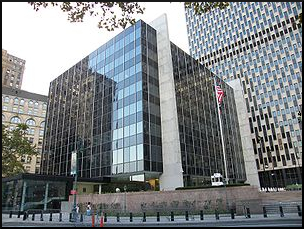US Trade Court to Rule on Validity of Trump Tariffs
By Reuters | 13 May, 2025
The US Court of International Trade hears the first of numerous challenges to Trump's authority to invoke emergency powers to impose tariffs.
Five American small businesses asked a U.S. court on Tuesday to halt President Donald Trump's "Liberation Day" tariffs, arguing that he overstepped his powers by declaring a national emergency to impose across-the-board taxes on imports from nations that sell more to the United States than they buy.
The Republican president's April 2 imposition of the tariffs "represents and unprecedented and unlawful expansion of executive authority," Jeffrey Schwab, a lawyer representing the plaintiffs, told a three-judge panel of the New York-based U.S. Court of International Trade.
Trump's interpretation, Schwab said, would allow him to impose tariffs "at any rate, at any time, simply by declaring a national emergency." No law gives the president the unilateral tariff authority that Trump has claimed, Schwab said.
During the hearing in the first major legal test of Trump's tariffs, the judges asked pointed questions of Schwab and Justice Department lawyer Eric Hamilton, arguing for the administration.
They asked Hamilton whether there are any limits of a president's tariff power.
"We have a national shortage of peanut butter. Can the president declare an extraordinary emergency?" U.S. District Judge Jane Restani asked. "What you're saying is there's no limit."
Trump cited a law called the International Emergency Economic Powers Act (IEEPA) as the legal authority for his tariffs. Hamilton said there are limits in IEEPA including the requirement for an "unusual and extraordinary" threat before a president acts and a mechanism for Congress to end a national emergency after the president declares one.
But Hamilton said that courts cannot step in to decide whether a national emergency exists because it is a political question.
The judges asked Schwab whether they have the authority to stop Trump from imposing the tariffs under federal law. Schwab said Trump's tariffs went well beyond what the law allowed, comparing them to a wild baseball pitch that was so far outside the strike zone that it goes behind a batter.
The judges pressed Schwab for a clearer answer.
"'You know it when you see it' doesn't work," Restani said.
Hamilton said economic conditions do justify concluding that there is a national emergency under IEEPA. The U.S. trade deficit has grown by 40% over the past five years, weakening the economy and the ability of domestic manufacturers to provide the military with needed equipment and supplies, Hamilton said.
"The trade deficit has threatened the supply chain. It has caused a state of affairs where the national defense industrial base is not adequately prepared to meet the challenges that the country faces," Hamilton said.
Schwab countered that the trade deficit is a "normal state of affairs" rather than an emergency.
'UNUSUAL AND EXTRAORDINARY'
The nonpartisan Liberty Justice Center filed the lawsuit on behalf of five small U.S. businesses that import goods from countries targeted by the duties. The companies, which range from a New York wine and spirits importer to a Virginia-based maker of educational kits and musical instruments, have said the tariffs will hurt their ability to do business.
The Justice Department has said that the lawsuit should be dismissed because the plaintiffs have not been harmed by tariffs that they have not yet paid, and because only Congress, not private businesses, can challenge a national emergency declared by the president under IEEPA.
The law is meant to address "unusual and extraordinary" threats, and the decades-long U.S. practice of buying more goods than it exports does not qualify as an emergency that would trigger IEEPA, according to the lawsuit.
The lawsuit is one of seven court challenges to Trump's tariff policies, and the first to seek a ruling that would stop the tariffs from proceeding.
The court previously rejected a request by the plaintiffs to temporarily pause the tariffs while their lawsuit plays out.
The court, which hears disputes involving international trade and customs laws, is expected to issue a decision in the coming weeks. Its decisions can be appealed to the U.S. Court of Appeals for the Federal Circuit in Washington, D.C., and ultimately the U.S. Supreme Court.
It is scheduled to hear another tariff challenge next week in a case brought by 12 U.S. states.
In imposing the tariffs, Trump called the trade deficit a "national emergency" that justified his 10% across-the-board tariff on all imports, with higher rates for countries with which the United States has the largest trade deficits, particularly China.
Many of those country-specific tariffs were paused a week later. The Trump administration on Monday said it was also temporarily reducing the steepest tariffs on China while working on a longer-term trade deal. Both countries agreed to cut tariffs on each other for at least 90 days.
Trump's on-and-off-again tariffs have shocked U.S. markets. He has framed them as a way to restore U.S. manufacturing capability.
(Reporting by Dietrich Knauth in New York and Blake Brittain in Washington, Editing by Alexia Garamfalvi, Will Dunham and David Gregorio)
"We have a national shortage of peanut butter. Can the president declare an extraordinary emergency?"

Asian American Success Stories
- The 130 Most Inspiring Asian Americans of All Time
- 12 Most Brilliant Asian Americans
- Greatest Asian American War Heroes
- Asian American Digital Pioneers
- New Asian American Imagemakers
- Asian American Innovators
- The 20 Most Inspiring Asian Sports Stars
- 5 Most Daring Asian Americans
- Surprising Superstars
- TV’s Hottest Asians
- 100 Greatest Asian American Entrepreneurs
- Asian American Wonder Women
- Greatest Asian American Rags-to-Riches Stories
- Notable Asian American Professionals

